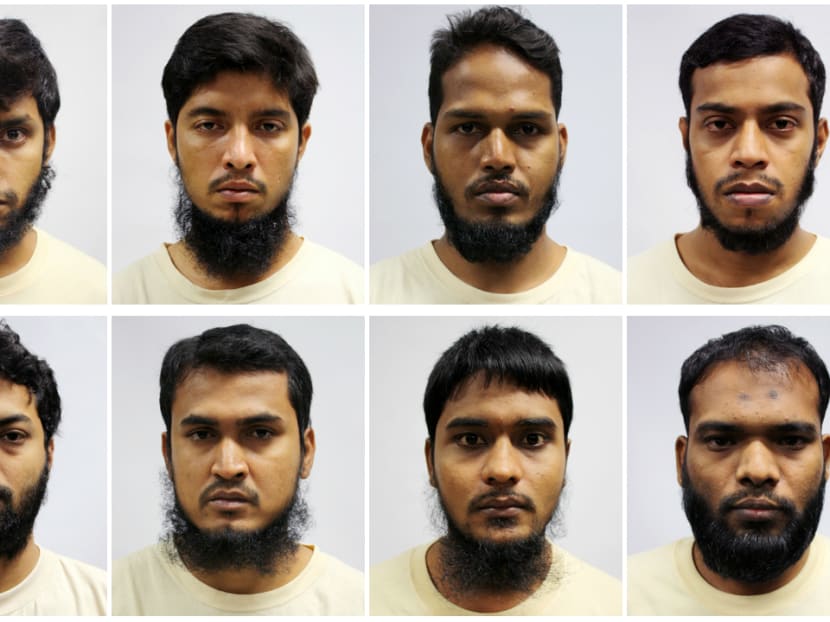8 Bangladeshis who plotted terror detained
SINGAPORE — Eight Bangladeshis working in Singapore, who recently formed a clandestine terror cell here aimed at bringing their homeland under Islamic State’s (IS) self-declared caliphate, have been arrested under the Internal Security Act (ISA) — the second reported case this year of radicalised individuals involving the Bangladeshi community here.

The eight Bangladeshi nationals who were detained in Singapore for terror-related activities. Photo: Ministry of Home Affairs
SINGAPORE — Eight Bangladeshis working in Singapore, who recently formed a clandestine terror cell here aimed at bringing their homeland under Islamic State’s (IS) self-declared caliphate, have been arrested under the Internal Security Act (ISA) — the second reported case this year of radicalised individuals involving the Bangladeshi community here.
The group of workers, aged between 26 and 34 and working in the construction and marine industries, set up Islamic State in Bangladesh (ISB) here in March but already had a hit list and raised funds in Singapore for the purchase of firearms to carry out their attacks when they were arrested last month, said the Ministry of Home Affairs (MHA) on Tuesday (May 3).
The ministry said ISB was started by Rahman Mizanur, a 31-year-old S-Pass holder, to overthrow the Bangladeshi government by force, establish an Islamic state there and bring it under IS’ self-declared caliphate.
While investigations have not revealed indications of any planned attack in Singapore, Rahman said he would launch an attack anywhere if he was instructed by IS to do so, the MHA added.
Rahman had also drawn up a document, titled “We Need for Jihad Fight”, which included a list of key Bangladeshi officials and leaders who could be targeted for attack.
Other materials found in his possession were manuals for making bombs and weapons, as well as propaganda material from IS and Al-Qaeda which Rahman used in his recruitment drive.
The other seven detainees are Mamun Leakot Ali, 29; Sohag Ibrahim, 27; Miah Rubel, 26; Zzaman Daulat, 34; Islam Shariful, 27; Md Jabath Kysar Haje Norul Islam Sowdagar, 30; and Sohel Hawlader Ismail Hawlader, 29. All of them held work permits, the MHA said.
At least two more ISB members are in Bangladesh, the detained members had told Singapore authorities.
Five other Bangladeshis here were also investigated. While the five were not found to be involved in the ISB, they were repatriated for possessing and/or proliferating jihad-related material, or supporting the use of armed violence for a religious cause, the MHA said.
The monies raised by Rahman’s group have been seized, and several of the detainees may be liable for prosecution for terrorism financing, said the MHA.
It added that the Government takes a serious view of any form of support for terrorism and will deal firmly with anyone who engages in activities “inimical to Singapore’s national security and racial and religious harmony”.
“ISB poses a security concern to Singapore because of its support for (IS) and its readiness to resort to the use of violence overseas ... Foreigners should not import their own domestic agenda into Singapore and carry out activities here in pursuit of such an agenda,” the ministry said.
In January, the MHA revealed that 27 Bangladeshi construction workers here were arrested after they were found to be contemplating waging armed jihad overseas.
Twenty six (26) of them have been repatriated while another remains in prison.
In a commentary published in February, S Rajaratnam School of International Studies (RSIS) Associate Research Fellow Iftekharul Bashar wrote that a segment of the Bangladeshi diaspora has been attracted to “global brands of terrorism”.
Overseas cells, he noted, are often a key source of funding for extremist groups in Bangladesh.
The country has been grappling with a rising tide of religious fundamentalism and radical ideology in recent years.
The latest issue of the Islamic State’s official publication Dabiq, released on April 13, features Bangladeshi extremist leader Shaykh Abu Ibrahim al-Hanif describing the jihad in Bangladesh as a springboard for extending the militants’ fight into neighbouring Myanmar and India.
Terror and security experts interviewed by TODAY called for the authorities to redouble their efforts in engaging the grassroots, comprising both Singaporeans and transient migrant workers, to detect and prevent similar episodes of radical activity.
Migrant workers are susceptible to radical narratives because they tend to be highly marginalised, said National University of Singapore political scientist Bilveer Singh.
The Islamic State “thinks migrant workers are ‘low-hanging fruits’, easily plucked as they are among the poorest and with the most grievances”, he added.
While the authorities must pay closer attention to the foreign-worker community, RSIS’ associate professor, Dr Kumar Ramakrishna, cautioned that this should be done in a way that does not ostracise them.
“We should remain alert, but not alarmed. A bag of bad apples should not change our attitude towards the community. A bulk of them are just here to earn a living,” he said.
THE EIGHT MEN ARRESTED
1. Rahman Mizanur, 31, the purported ringleader
2. Mamun Leakot Ali, 29
3. Sohag Ibrahim, 27
4. Miah Rubel, 26
5. Zzaman Daulat, 34
6. Islam Shariful, 27
7. Md Jabath Kysar Haje Norul Islam Sowdagar, 30
8. Sohel Hawlader Ismail Hawlader, 29
Correction: In an earlier version of this report, we stated that the detainees had drawn up the list of targets. This is incorrect. The list was found on Rahman Mizanur.






